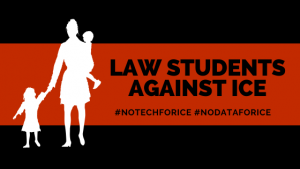Reuters & RELX – Drop Your ICE Contracts!




We are law professors, librarians, attorneys, and law students who are deeply concerned about the role that Thomson Reuters and RELX play in human rights abuses against immigrants.
Thomson Reuters (parent company to Westlaw) and RELX plc (parent company to LexisNexis) play key roles in fueling the surveillance, imprisonment, and deportation of hundreds of thousands of immigrants each year. ICE is relying on the data and technology provided by your legal search engines to track and arrest immigrants on a massive scale.
We invite other individuals and organizations to join us in demanding that these companies to end their contracts with ICE.
Read the Full Letter
We are law professors, librarians, attorneys, and law students who are deeply concerned about the role that Thomson Reuters (parent company to Westlaw) and RELX plc (parent company to LexisNexis) play in fueling the surveillance, imprisonment, and deportation of hundreds of thousands of immigrants each year. ICE is relying on data supplied by Thomson Reuters and RELX to track and arrest immigrants on a massive scale. What’s more, neither company will say whether lawyers’ research data is being shared with ICE. The extent of your collaboration with ICE—and its devastating impacts on immigrant communities—has been increasingly exposed and was recently highlighted in the New York Times Magazine article “How ICE Picks Its Targets in the Surveillance Age.”[1] We ask that you end the data brokering deals that provide ICE with personal information the agency uses to identify, track, and target immigrants, refugees, and asylum-seekers for arrest and deportation.
Your companies provide large-scale support to ICE’s campaign against immigrant families and communities. Thomson Reuters currently holds six distinct contracts with ICE for a total potential value of $54,399,414.[2] These contracts provide ICE with access to the Thomson Reuters CLEAR platform, Vigilant’s license plate reader database, “data and analyst services,” and “risk mitigation services.” An ACLU investigation found that ICE carries out thousands of license plate searches a month to conduct surveillance on immigrants and their family members. These can be a precursor to the arrests, detention, and deportation of their targets.[3] RELX currently holds contracts with ICE for LexisNexis Accurint subscriptions and computer licenses worth a combined $2,241,878.[4] ICE contracting documents from 2013 describe LexisNexis databases provided through Reed Elsevier as “mission critical” to ICE Enforcement and Removal Operations in leveraging “emerging technology that shares secure law enforcement data between Federal, State and local law enforcement agencies.”[5]
In addition, both Thomson Reuters and LexisNexis have data partnerships with surveillance giant Palantir, the tech backbone of ICE, such that ICE may access data through Palantir independently of these two companies’ ICE contracts.[6] Indeed, Thomson Reuters CLEAR services for ICE are required to be compatible with the analytics program that Palantir developed for ICE, indicating a direct interface between the Thomson Reuters and Palantir software.[7] RELX also has a direct financial stake in Palantir: its subsidiary venture capital firm, REV Venture Partners Limited, was an early investor. As of 2008, the fund owned more than 10% of a class of Palantir shares.[8]
Palantir, which specializes in big data analytics, has already faced significant pushback for providing tracking, profiling, and prediction technologies to military and law enforcement agencies across the country.[9] The company has multiple contracts to provide the tech that allows Immigration and Customs Enforcement (ICE) to identify, track, and target immigrants, refugees, and asylum-seekers for deportation.[10] Recent reports show that Palantir’s case management systems were used in operations to arrest family members and sponsors of unaccompanied children who crossed the border.[11] Palantir’s software was also used in the workplace raids that swept Mississippi in August, the largest immigration raids in a decade.[12] Palantir’s software is routinely used in such raids, including those that targeted 7-11s across New York in 2017.[13] Despite Palantir’s public relations campaign to minimize its role in policing and immigration enforcement, pushback against Palantir is growing.
Given the legal community’s heavy reliance on Thomson Reuters and LexisNexis for legal research tools (Westlaw and Lexis), we are concerned about the ethics of our law schools and workplaces contracting services that enable and profit from digital deportation machinery.[14] Beyond raising professional responsibility red flags, facilitating ICE surveillance violates your codes of corporate responsibility. You are participating in surveillance and deportation practices that culminate in the cruel and unethical treatment of vulnerable populations on an almost unprecedented scale. As law professors and other clients learn about your participation in ICE surveillance, you may lose market share today. More importantly, in the future, your companies will be inextricably linked to ICE’s harmful immigration policies and actions. History will not be kind in characterizing your decision to support the work of ICE.
We, the undersigned legal scholars, practitioners, and students, call on Thomson Reuters and RELX to terminate all contracts with Palantir, ICE, and DHS. The time is now to stop enabling and profiting from the misery being inflicted on immigrant communities by ICE.
Citations:
1. McKenzie Funk, “How ICE Picks its Targets in the Surveillance Age,” New York Times (October 2, 2019), https://www.nytimes.com/2019/10/02/magazine/ice-surveillance-deportation.html.
2. Thomson Reuters and subsidiary West Publishing Corporation both have contracts with ICE. Active Thomson Reuters contracts with ICE include Award IDs 70CMSD19FR0000116, HSCEMD17F00008 and 70CDCR18P00000017 (through subsidiary West Publishing Corporation) as well as Award IDs 70CMSD19P00000129, 70CMSD18P00000145, 70CMSD19C00000001, HSCEMD16C00002, and 70CDCR18P00000048 (through Thomson Reuters Special Services LLC).
3. Vasudha Talla, “Documents Reveal ICE Using Driver Location Data From Local Police for Deportations,” ACLU of Northern California (March 13, 2019), https://www.aclu.org/blog/immigrants-rights/ice-and-border-patrol-abuses/documents-reveal-ice-using-driver-location-data.
4. Active RELX contracts with ICE include Award IDs 70CDCR19FR0000063 and HSCECR15P00009.
5. Justification for Other than Full and Open Competition, Solicitation No. HSCECR-13-F-00032, https://www.fbo.gov/index?s=opportunity&mode=form&id=4e90a456155db39df108857eb970148d&tab=core&_cview=0.
6. Palantir, Data & Device Partnerships, https://www.palantir.com/partnerships/data-providers/.
7. Limited Source Justification for Solicitation No. HSCEMD-15-Q-00014, https://www.fbo.gov/index.php?s=opportunity&mode=form&id=d434810ca2d525dd29526262f397f66f&tab=core&_cview=0.
8. Securities & Exchange Commission, Palantir Technologies Form D, February 28, 2008, https://www.sec.gov/Archives/edgar/vprr/0804/08042737.pdf
9. Peter Waldman, Lizette Chapman, and Jordan Robertson, “Palantir Knows Everything About You,” Bloomberg Businessweek (April 19, 2018), https://www.bloomberg.com/features/2018-palantir-peter-thiel/.
10. A report commissioned by Mijente, Immigrant Defense Project and National Immigration Project of the NLG to research contracts held by technology companies related to immigration enforcement technologies. “Who’s Behind ICE? The Tech and Data Companies Fueling Deportations,” Empower LLC, Mijente, IDP, NIPNLG (October 2018), p. 31-35, 38, 43-45. https://mijente.net/wp-content/uploads/2018/10/WHO’S-BEHIND-ICE_-The-Tech-and-Data-Companies-Fueling-Deportations_v3-.pdf. Manish Singh, Palantir’s Software Was Used for Deportation,” TechCrunch (May 2019), https://techcrunch.com/2019/05/03/palantirs-software-was-used-for-deportations-documents-show/.
11. Sam Biddle and Ryan Devereaux, “Peter Thiel’s Palantir Was Used To Bust Relatives of Migrant Children, New Documents Show,” The Intercept (May 2, 2019), https://theintercept.com/2019/05/02/peter-thiels-palantir-was-used-to-bust-hundreds-of-relatives-of-migrant-children-new-documents-show/.
12. “Palantir’s technology used in Mississippi raids where 680 were arrested,” Mijente (October 4, 2019), https://mijente.net/2019/10/04/palantirpowersraids/
13. George Joseph, “Data Company Directly Powers Immigration Raids in Workplaces,” WNYC (july 16, 2019), https://www.wnyc.org/story/palantir-directly-powers-ice-workplace-raids-emails-show/
14. Ethical considerations include potential client confidentiality, zealous advocacy, and other professional responsibility issues. Sarah Lamdan, When Westlaw Fuels ICE Surveillance: Legal Ethics in the Era of Big Data Policing, 43 NYU Review of Law and Social Change 255 (2019), https://socialchangenyu.com/review/when-westlaw-fuels-ice-surveillance-legal-ethics-in-the-era-of-big-data-policing/.
View Signatories
Organizations:
Center for Constitutional Rights
National Lawyers Guild
Just Futures Law
Immigration Law Society
Center for Human Rights and Justice
Legal Aid Justice Center
National Immigration Law Center
Carla Sanderson Law
People’s Parity Project
CAIR Cincinnati
Signs of Providence
Incarcerated Mothers Advocacy Project
University of Washington School of Law
Tech & Public Interest Law & Policy @ Berkeley Law
Center on Privacy & Technology at Georgetown Law
Immigrant & Non-Citizen Rights Clinic; CUNY School of Law
CUNY Law Formerly Incarcerated Law Student Advocacy Association
OutLaws at Yale Law School
Yale Law School Democrats
Yale Law School Muslim Law Students Association
Law Students for Justice in Palestine, Berkeley Law
National Lawyers Guild, Berkeley Law
NLG at Loyola Law School
ACLU, Loyola
La Raza de Loyola
Chicago-Kent College of Law Chapter of the National Lawyers Guild
IRAP NYU (International Refugee Assistance Project)
NYU Suspension Representation Project
Archivists Round Table of Metropolitan New York
New York Law School Immigration Law Students Association
American Constitution Society, Penn Law Chapter
Penn Law NLG
If/When/How: Lawyering for Reproductive Justice, Suffolk Law Chapter
National Lawyers Guild, University of Washington
University of Washington School of Law
Student Bar Association, University of Washington School of Law
Suffolk Law Chapter of the National Lawyers Guild
Board of Immigration Advocacy Project at Fordham University School of Law
National Lawyers Guild, UMass Law Student Chapter
Michigan Immigration and Labor Law Association (MILLA) at U-M Law School
UNH Law Diversity Coalition
Harvard Law School Labor Employment Action Project
Criminal Justice Society at UCLA School of Law


